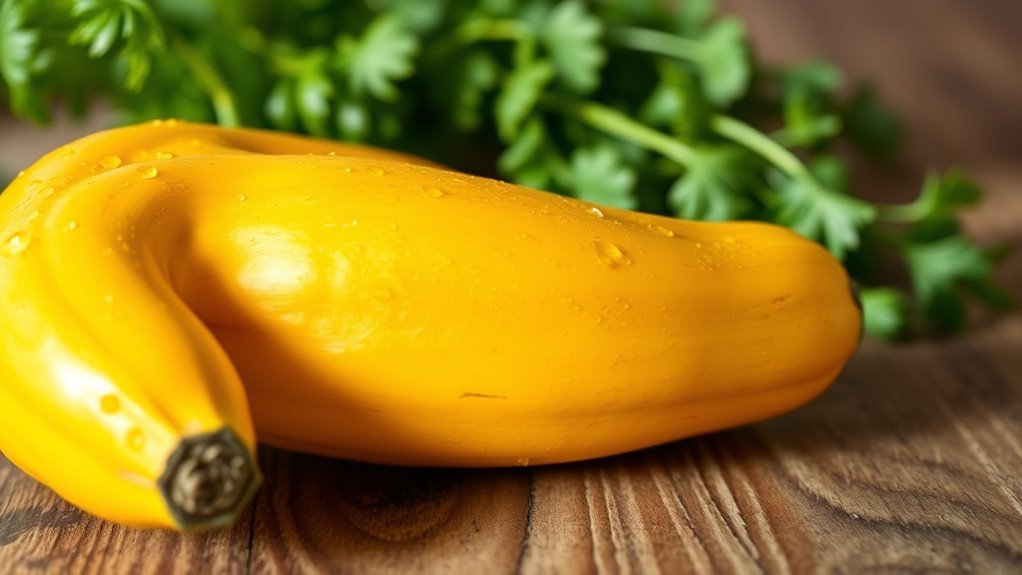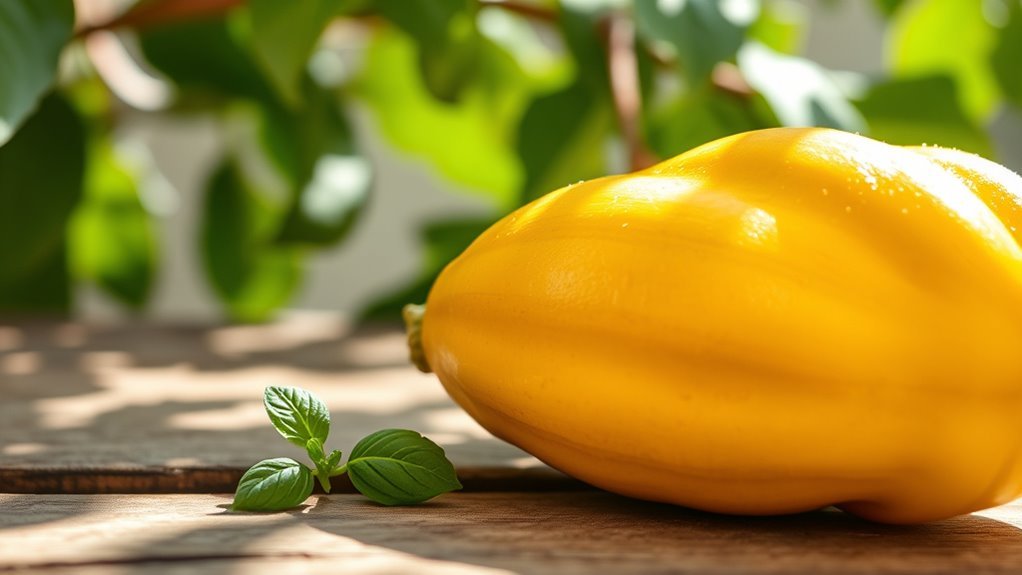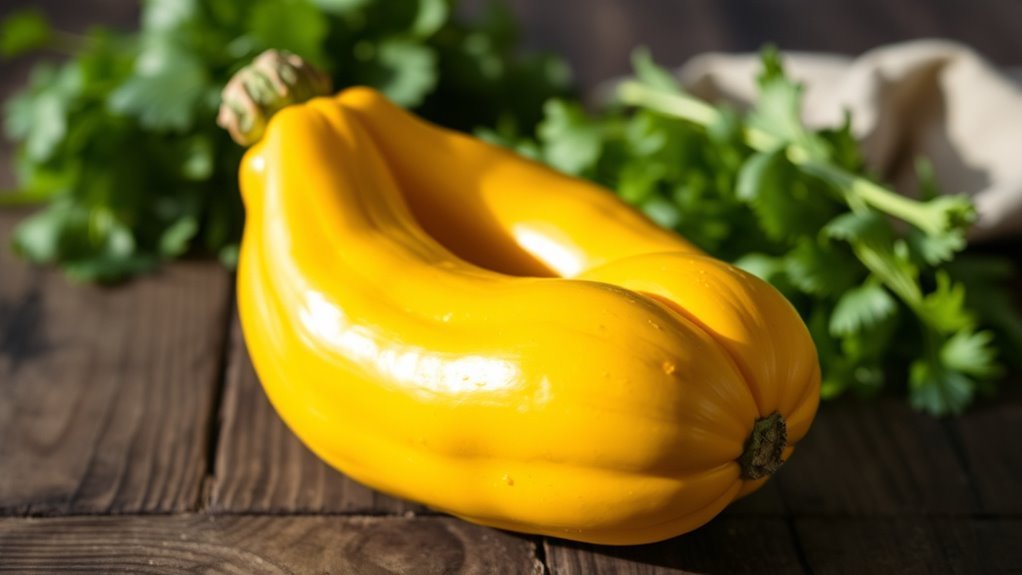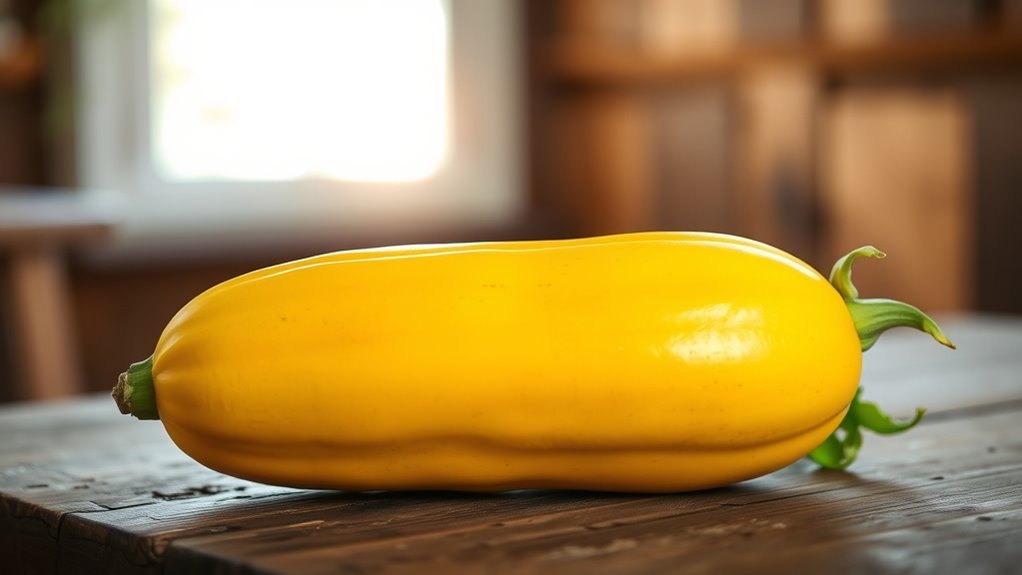Yes, yellow squash is keto-friendly. It contains about 3 to 4 grams of net carbs per serving, making it a low-carb vegetable that fits well into your diet. Not only is it low in calories, but it also offers vitamins A and C and beneficial antioxidants. Just be mindful of portion sizes to maintain your carb intake. If you’re curious about how to incorporate yellow squash into your meals or its other benefits, there’s more to discover.
Nutritional Profile of Yellow Squash

When it comes to understanding the nutritional profile of yellow squash, you’ll find it to be a low-calorie vegetable packed with essential nutrients. This vibrant squash is rich in vitamins A and C, which can support your immune system and promote healthy skin. It also contains antioxidants that may help reduce inflammation. The health benefits don’t stop there; yellow squash is high in fiber, aiding digestion and keeping you full longer. For serving suggestions, consider grilling or roasting it for a delicious side dish, or adding it to salads for extra crunch. You can also spiralize it as a low-carb pasta alternative. Embracing yellow squash in your meals not only enhances flavor but also supports your overall well-being.
Carb Content Breakdown

Yellow squash typically contains about 4 grams of carbohydrates per 100 grams, making it a suitable option for those following a ketogenic diet. When considering different yellow squash varieties, you’ll find that they maintain similar carb counts, keeping your keto meal prep simple and effective.
Here’s a quick breakdown:
| Yellow Squash Varieties | Carbohydrates (per 100g) |
|---|---|
| Yellow Zucchini | 3.1 g |
| Crookneck Squash | 4.0 g |
| Straightneck Squash | 4.2 g |
Choosing yellow squash can help you stay within your carb limits while providing essential nutrients. This versatility makes it a great addition to any keto-friendly meal plan. Enjoy cooking!
Comparing Yellow Squash to Other Vegetables

How does yellow squash stack up against other vegetables on a ketogenic diet? When you look at yellow squash varieties, they generally contain fewer carbs compared to starchy vegetables like potatoes and corn. For example, one cup of yellow squash has about 4 grams of net carbs, while a serving of peas can have around 10 grams. This makes yellow squash a more keto-friendly option. In vegetable comparisons, it also offers a good source of vitamins, making it a nutritious choice for those on a low-carb diet. While leafy greens like spinach and kale are even lower in carbs, yellow squash still provides versatility and flavor without derailing your keto goals. Enjoying it in moderation can keep your meals exciting and compliant.
Health Benefits of Yellow Squash
Incorporating yellow squash into your diet not only adds flavor but also brings numerous health benefits. This vibrant vegetable is low in calories and high in essential nutrients, making it a great choice for maintaining a healthy weight. Yellow squash is rich in vitamins A and C, which support your immune system and promote healthy skin. Additionally, its fiber content aids digestion and helps regulate blood sugar levels, making it beneficial for those with diabetes. The antioxidants found in yellow squash can combat oxidative stress, contributing to overall well-being. By including yellow squash in your meals, you’re not just enhancing taste; you’re also investing in your health and wellness. Embrace the benefits of this versatile vegetable!
How Yellow Squash Fits Into a Keto Diet
When considering yellow squash in a keto diet, it’s essential to look at its nutritional profile, particularly its carbohydrate content. You’ll find that this vegetable offers a low-carb option that can fit well into your meal plans. Plus, various cooking methods can enhance its flavor while keeping it keto-friendly.
Nutritional Profile Overview
Although yellow squash is often overlooked in discussions about keto-friendly vegetables, its nutritional profile makes it a suitable option for those following a ketogenic diet. Packed with vitamins A and C, yellow squash benefits your immune system and promotes healthy skin. With its low-calorie count and high water content, it can help you feel full without derailing your carb intake. There are various yellow squash varieties, including summer and winter squash, each offering unique flavors and textures. Incorporating these into your meals not only adds color but also provides essential nutrients, making it easier to maintain your keto lifestyle. So, don’t shy away from yellow squash; it can be a delicious and nutritious addition to your plate.
Carbohydrate Content Analysis
Understanding the carbohydrate content of yellow squash is essential for anyone on a keto diet. This vegetable contains about 4 grams of carbs per cup, making it a low-carb option that can fit well into your meal plan. Yellow squash also boasts various health benefits, including vitamins A and C, which support your immune system and skin health. When you incorporate yellow squash into your meals, consider using cooking techniques like grilling or sautéing to enhance its flavor while keeping the carb count low. This way, you can enjoy delicious dishes without compromising your keto goals. By being mindful of its carbohydrate content, you can freely enjoy yellow squash while reaping its nutritional benefits.
Cooking Methods and Ideas
While yellow squash is a versatile vegetable that can enhance your keto meals, selecting the right cooking methods can maximize its flavor and nutritional benefits. You can explore various grilling techniques or sautéing options to create delicious dishes. Here’s a quick comparison to help you choose:
| Cooking Method | Flavor Profile | Nutritional Value |
|---|---|---|
| Grilling | Smoky, charred | Retains vitamins |
| Sautéing | Tender, rich | Quick cooking, less nutrient loss |
| Baking | Sweet, mellow | Higher water loss |
These methods not only keep the squash’s low-carb profile intact but also allow you to enjoy its unique taste. Experiment with spices and herbs to elevate your meals while staying keto-friendly.
Popular Ways to Prepare Yellow Squash
When you’re looking to add some variety to your keto meals, yellow squash offers a versatile ingredient that can be prepared in several delicious ways. You might enjoy stuffed squash with a savory filling or whip up some crispy squash fritters for a snack. Grilled squash adds a smoky flavor to your plate, while a comforting squash casserole can be a great side dish. For a revitalizing option, try a squash salad tossed with your favorite keto-friendly dressing. Roasted squash brings out its natural sweetness, and a quick squash stir fry makes for a fast meal. Don’t forget about creamy squash soup or noodle-like squash noodles as alternatives to traditional pasta. Baked squash can also be a delightful treat!
Portion Control: Serving Sizes and Carb Count
When considering yellow squash on a keto diet, it’s crucial to pay attention to serving sizes and carb counts. A typical serving size of about one cup contains roughly 7 grams of carbohydrates, which can impact your ketosis if you’re not mindful. Understanding these details can help you enjoy yellow squash while staying within your carb limits.
Recommended Serving Sizes
Understanding the recommended serving sizes for yellow squash is essential for those following a keto diet. To maintain ketosis while enjoying this nutritious vegetable, consider portion sizes around one cup, which typically equates to about 20 calories. This serving provides a great base for various serving suggestions, like sautéing with olive oil or adding to salads. If you’re looking to enhance your meals, try pairing yellow squash with keto-friendly ingredients like cheese or herbs. Being mindful of your portion sizes not only helps you stay within your carb limit but also allows you to enjoy the versatility of yellow squash. With thoughtful planning, you can savor this delicious vegetable while adhering to your dietary goals.
Carb Count Breakdown
Maintaining portion control is essential for anyone following a keto diet, especially when it comes to tracking carbohydrate intake. Yellow squash is a nutritious vegetable that offers good keto compatibility, but it’s vital to monitor your serving sizes to stay within your carb limits.
Here’s a quick carb count breakdown for yellow squash:
- One cup of sliced yellow squash contains about 4 grams of carbohydrates.
- It’s low in calories, with approximately 18 calories per cup.
- Yellow squash also provides fiber, which can help with digestion.
Impact on Ketosis
Although yellow squash can be a great addition to your keto diet, its impact on ketosis hinges on portion control and carb count. You’ll want to keep an eye on serving sizes to guarantee that the ketosis effects remain favorable. Here’s a quick guide to help you navigate your dietary considerations:
| Serving Size | Net Carbs (g) |
|---|---|
| 1 cup, sliced | 4 |
| 1 medium squash | 6 |
| 1 cup, cooked | 3 |
| 1 cup, mashed | 5 |
| ½ cup, raw | 2 |
Potential Drawbacks of Yellow Squash on Keto
While yellow squash can be a nutritious addition to many diets, it may pose some challenges for those following a strict ketogenic regimen. Here are a few potential drawbacks to take into account when meal planning for keto:
- Carbohydrate Content: Yellow squash contains more carbs than many other low-carb vegetables, which can impact your nutritional balance.
- Fiber Impact: Although it’s high in fiber, the type of fiber may not contribute notably to your daily carb limit, making it less effective for ketosis.
- Potential Overconsumption: It’s easy to underestimate portion sizes, leading to unintentional carb overload.
Being mindful of these factors can help you maintain your keto goals while still enjoying the benefits of yellow squash. Always assess how it fits into your overall dietary needs.
Recipes Featuring Yellow Squash
If you’re looking to incorporate yellow squash into your keto meal planning, there are plenty of delicious recipes that can help you do just that. Try spiralizing yellow squash as a low-carb noodle substitute in savory dishes like zucchini lasagna. You can also roast it with olive oil and your favorite herbs, pairing it with other vegetables for a vibrant summer recipe. For a creamy side, sauté yellow squash with garlic and toss it in a low carb sauce, like Alfredo made from cream and cheese. Don’t forget to experiment with various vegetable pairings, as yellow squash complements ingredients like bell peppers and spinach beautifully. With these ideas, you’ll enjoy flavorful meals without compromising your keto goals.
Final Thoughts on Yellow Squash and Keto
When considering yellow squash on a keto diet, it’s important to look at its nutritional profile and carb content. Comparing it to other vegetables can help you determine if it fits within your daily carb limits. Additionally, the cooking methods you choose can influence its overall health benefits and compatibility with your keto lifestyle.
Nutritional Profile Overview
Understanding the nutritional profile of yellow squash can help you determine its suitability for a keto diet. This versatile vegetable comes in several yellow squash varieties, each offering unique culinary uses and nutritional benefits.
- Low in calories, making it a great option for weight management.
- Rich in vitamins A and C, which support immune health and skin wellness.
- Contains fiber, aiding digestion and promoting a feeling of fullness.
While yellow squash can be included in a keto diet, it’s essential to take into account portion sizes and how it fits into your overall carb intake. Embracing its versatility in dishes can add flavor and nutrition to your meals while allowing you the freedom to enjoy a variety of foods.
Carb Content Comparison
Comparing the carb content of yellow squash to other vegetables can provide valuable insights for those following a keto diet. Yellow squash typically contains about 4 grams of carbs per cup, making it a favorable option for low-carb eating. Here’s a quick comparison:
| Vegetable | Carbs (per cup) | Health Benefits |
|---|---|---|
| Yellow Squash | 4g | High in vitamins A & C |
| Zucchini | 4g | Rich in antioxidants |
| Cauliflower | 5g | Supports digestion |
| Broccoli | 6g | Good for heart health |
| Spinach | 1g | Boosts iron levels |
Incorporate yellow squash into salads or stir-fries for delicious serving suggestions while reaping its health benefits! Enjoy the freedom of flavorful, low-carb options.
Cooking Methods Considerations
Although yellow squash is a versatile and nutritious option for a keto diet, the cooking methods you choose can influence its health benefits and carb content. Opting for healthier cooking techniques not only preserves the nutrients but also enhances flavor combinations that can elevate your meals.
- Sautéing: Quick and retains nutrients while adding a nice caramelization.
- Grilling: Infuses a smoky flavor, making it a delicious side or main dish.
- Roasting: Concentrates sweetness and can be paired with herbs for added depth.
Experimenting with these methods allows you to enjoy yellow squash in various forms, keeping your keto journey exciting and flavorful. Remember, how you cook matters just as much as what you cook!
Frequently Asked Questions
Is yellow squash keto-friendly?
Yes, yellow squash is considered keto-friendly. It is low in carbohydrates, with approximately 4 grams of net carbs per cup (cooked). This makes it a suitable option for those following a ketogenic diet, which emphasizes low carbohydrate intake while promoting healthy fats and moderate protein consumption.
What are the nutritional benefits of yellow squash?
Yellow squash is not only low in carbs but also rich in vitamins and minerals, including vitamin C, vitamin B6, potassium, and magnesium. It is also high in antioxidants, which can help combat oxidative stress and inflammation in the body. Additionally, its high water content aids in hydration and contributes to overall digestive health.
How can I incorporate yellow squash into a keto diet?
There are many ways to incorporate yellow squash into a keto diet. You can sauté it with olive oil and garlic, add it to salads, or use it as a base for various dishes. Yellow squash can be spiralized to make a low-carb substitute for pasta, or roasted as a side dish. Its mild flavor pairs well with a variety of seasonings, making it a versatile ingredient in keto-friendly recipes.
Are there any downsides to eating yellow squash on a keto diet?
While yellow squash is generally healthy and keto-friendly, it is important to consume it in moderation. Overeating even low-carb vegetables may lead to exceeding your daily carbohydrate limit, depending on your individual dietary goals. Additionally, some people might experience digestive discomfort if they consume large amounts of fiber-rich vegetables like yellow squash, especially if they are not accustomed to a high-fiber diet.
What is the difference between yellow squash and zucchini in terms of keto compatibility?
Both yellow squash and zucchini are low in carbohydrates and suitable for a keto diet. The primary difference lies in their flavor and texture. Yellow squash tends to be slightly sweeter and has a softer skin, while zucchini has a firmer texture and a more neutral taste. Nutritionally, they are quite similar, with both offering low net carbs and high nutrient density, making either a great choice for keto meals.
References
- https://www.healthline.com/nutrition/low-carb-vegetables
- https://www.ncbi.nlm.nih.gov/pmc/articles/PMC6464646/
- https://www.webmd.com/diet/healthy-keto-diet-foods
- https://www.health.harvard.edu/staying-healthy/the-ketogenic-diet-is-it-right-for-you
- https://www.choosemyplate.gov/eathealthy/vegetables
- https://www.verywellfit.com/what-is-the-keto-diet-5196880
- https://www.eatright.org/health/diets/keto-diet-what-you-need-to-know
- https://www.cdc.gov/nutrition/resources-publications/index.html


